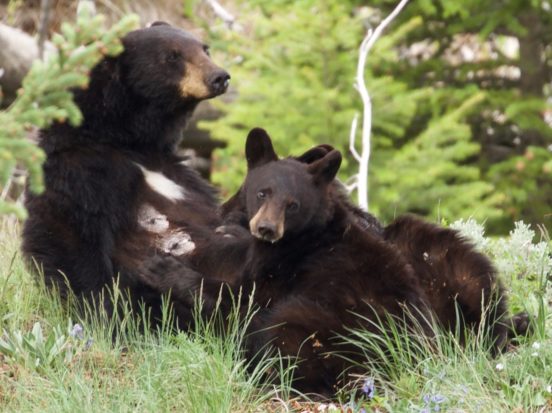
Dozens of bears are dying because of incidental human interactions each year. They are hit by cars. Shot by poachers. Killed if there is a human encounter. Targeted if they menace livestock. Above, a black bear mother nurses her cubs in Yellowstone National Park. Photo by Wendy Keefover/The HSUS
Throughout the country, humans are crossing paths with bears, and in almost every case, the bears end up on the losing side.
Near the top of Togwotee Pass in Wyoming, a photographer snapped a picture of a grizzly bear with a Conibear-style furbearer trap clamped over one paw. Conibear traps are the biggest and most powerful of body-gripping traps,devised to break the necks or backs of beavers or muskrats who swim into the devices and trigger them.
The grizzly must have been foraging or exploring in streams, as bears do, but the person who set that trap just changed that bear’s odds for survival.
In Connecticut, state authorities killed a black bear after the animal took a swipe at a hiker on a trail with her dog; though the hiker was spooked and rattled, to be sure, she required no medical attention. The bear was probably as startled as the woman and her dog, and reacted quickly, but most certainly without lethal intent. The tragedy is compounded because she was a nursing mother, and the decision to kill her most certainly dooms her cubs. Bear cubs need their mother for 18 months before they go their own way.
We’ve seen it time and again. Stronger policies are needed to produce different outcomes. More states need to ban these indiscriminate and inhumane body-gripping traps (Arizona, California, Colorado, Massachusetts, and Washington severely restrict them). The suffering and death they cause to beavers and other targeted wildlife warrant remedial policies, but when you add in the non-target injuring and killing of wildlife, the case for action is made even stronger. Bears, eagles, pets, and other creatures stumble into these landmines, and then suffer the consequences.
In Connecticut, we need to think through policies that call for lethal responses to any kind of encounter. Bear attacks are exceedingly rare, and while The HSUS does support selective removal of bears who threaten people, there are incidents that can and should be excused. The Connecticut incident sounds like a case where leniency was warranted. Bears generally recognize people as a threat and stay away, but they make spot judgments like we do. I am quite sure that the experience with the hiker and the dog was frightening for the bear. It certainly would not have emboldened the bear to seek out other encounters with people.
Incidents with humans and bears produce very substantial annual mortality for the bears. They are hit by cars. Shot by poachers. Killed if there is a human encounter. Targeted if they menace livestock.
Yet despite dozens of bears dying because of incidental human interactions each year, the U.S. Fish and Wildlife Service is planning this summer to announce removing protections under the Endangered Species Act (ESA) for Yellowstone-area grizzly bears. It was under that act that The Fund for Animals, our sister organization, stopped Montana from opening up a trophy-hunting season on bears in the 1990s, invoking the protective language of the ESA.
Delisting will wipe away those protections, and throw full management authority to the states. That will put vastly larger numbers of bears at risk in Idaho, Montana, and Wyoming, on top of the array of risks that grizzlies already face.
We are particularly concerned about the latest plans by the states to open trophy-hunting seasons. Conservationists, local residents, and business owners whose livelihoods depend on the singular tourism opportunity that the grizzlies provide object to the plans, but their voices have not been adequately heard. Just this week, HSUS attorneys were in court in Montana asking to allow more citizen input before any hunting season takes place. In April, our attorneys were in a Wyoming court, making many of the same points regarding that state’s hunting plans.
It’s clear that these and other states are locked and loaded for trophy hunting, despite there being fewer than 700 grizzly bears in the Yellowstone region. We’re committed to fighting at the state and federal level for grizzlies to make sure that their recovery is not jeopardized by a hastily conceived open season. Bears have enough troubles, and allowing people to seek bears out to chase and kill them as a head-hunting exercise is the last thing they need.
The post States on the attack against black bears, grizzly bears appeared first on A Humane Nation.
Enviroshop is maintained by dedicated NetSys Interactive Inc. owners & employees who generously contribute their time to maintenance & editing, web design, custom programming, & website hosting for Enviroshop.
